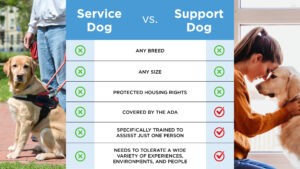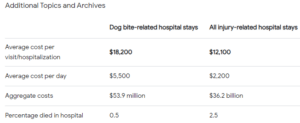Service dogs receive a higher level of training than most household pets, but that doesn’t mean they never bite. Although it’s less common with a service dog than a household pet, dog bite attacks are always serious. If you are ever attacked by a service dog in Arizona, the law is on your side. Strict dog bite liability laws in AZ are written to protect victims of service dog bites and prevent repeat attacks
In Arizona, the law is not forgiving when it comes to dog bite injuries. The owner is almost always at fault for the dangerous misbehavior of their service dog. These attacks are often sudden and without warning. You can’t always prevent a vicious dog, but knowing your rights keeps you a step ahead.
Use this blog to learn key definitions and steps to take after a dog bite incident.
What is Considered a Service Dog in Arizona?
Arizona service animal laws align with definitions and statutes outlined by the American with Disabilities Act (ADA). A service animal is usually a dog (or in rare cases, a miniature horse) that is trained to help with specific tasks. In Arizona, service animals are required to be non-aggressive and under control of their owner by a harness, leash, or voice command.
Since service dogs are considered medical equipment, they can go anywhere without restriction and, contrary to popular belief, do not require any certification or special ID–owners don’t need to carry any sort of registration for their service animal.
Emotional support animals are not the same as service animals. They do not have the same access.
What Should You Do if a Service Animal Attacks?
Follow these steps if a service dog bites:
-
Seek Medical Attention
Don’t delay treatment if you’re wounded by a dog bite. Make sure your provider is keeping detailed documentation of the severity of the bite, your treatment plan, and any possible long-term outcomes of the injury.
-
Report the Dog Bite
Arizona dog bite laws require anyone with “direct knowledge” of the dog bite incident to report it to animal control immediately. That includes owners, victims, witnesses, and potentially doctors treating the bite.
-
Collect Evidence
Take pictures, videos and even audio recordings. Building a strong case requires strong evidence. Pictures of your wound, the dog that bit you, the dog’s owner, and your surroundings could all come in handy later on.
-
Hire a Dog Bite Lawyer
Consult with a personal injury lawyer as soon as possible, ideally within a few days or a week. An experienced dog bite attorney can provide invaluable guidance and legal counseling to get your claim started, build out your case, and maximize your compensation.
Properly trained service animals are less likely to attack unprovoked, which is why you’ll need a team of dog bite lawsuit specialists to build an air-tight case.
Service Dog Bite Liability: Who’s to Blame?
All service animals must be under control of their handler, which is usually the dog’s owner. Although service dogs are protected by disability laws, state laws prioritize public safety above all else. The law is clear: the service dog handler is liable for any damages caused by a service animal or service animal-in-training.
There are no laws protecting a service dog that bites or attacks. All dog bites in Arizona are considered equally under the state’s strict liability laws. Civil statutes are written to protect dog bite victims and assign liability to the dog’s owner or handler.
It’s rare that anyone other than the owner is liable after a dog attack, but it can happen. If the dog owner or service dog handler can prove that a dog bite victim intentionally provoked the dog, they might not be fully liable for all damages caused. This is why it’s so important to document the incident as much as possible!
Compensation After a Service Dog Bites in AZ
Yes, you can file a claim and seek compensation after a service dog attacks you. The exact details of your claim will determine the actual payout. This is often covered by individual homeowner or renter insurance, but actual policy coverage can vary.
The number of dog bite personal injury claims is on the rise, and average claim value has skyrocketed in recent years. The average dollar value of dog injury claims increased from $58,545 in 2023 to $69,272 2024 (that’s an 18.3% change!), according to the Insurance Information Institute.
The latest study by the III mentions two key reasons for the increase:
- Higher medical costs
- Upward trend in total settlements awarded
Tangible and intangible losses are both included as part of compensation calculations. The best way to maximize your settlement after a dog bite attack is to work with a personal injury attorney.
Tangible Economic Losses
Medical costs, lost wages, and personal property damage are relatively straightforward calculations that go into final claim determinations. These are tangible losses, meaning their is a simple dollar amount assigned to each loss.
Medical costs consider all treatments related to the dog bite, including the cost of emergency care, surgeries, follow-up treatment, ongoing treatments, and any future costs.
Intangible losses
Although they are called “intangible,” these losses are very real. After a traumatic dog bite incident, you are compensated not only for the actual money spent to remediate the injury, but also for the long-term effects you may experience.
Pain and suffering, permanent disfigurement, and general loss of enjoyment of life are all weighed on a case-by-case basis.
Looking for Dog Bite Lawsuit Specialists?
You shouldn’t have to take on a complex dog bite case on your own. The complexities of the legal system as well as your individual case can feel overwhelming without the right support.
Contact the legal experts at Brad Johnson Injury Law for a free consultation today.


